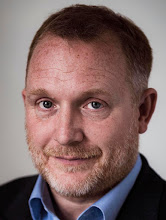I have just finished reading The World in Six Songs by Daniel Levitin, which was a birthday present from a friend that I highly recommend.
[note to self: is the fact that all of my birthday presents were either books or malt whiskey something I should be concerned by or proud of?]
In it Levitin examines the evolution of music alongside the evolution of human consciousness. This sounds terribly dry but is in fact compelling and fun in his hands he marries it to a dissection of the music of The Beatles, Paul Simon, Neil Young to Arcade Fire, Sting and Johnny Cash.
In any case towards the end of the book he talks about systems displaying evidence of consciousness. An individual ant in an any colony is no more aware of the actions of the whole than an individual neuron in the brain is aware of taste or thought or dreams.
This made me think about Michael Wesch's YouTube film "The Machine is Us" from a year of so back. Millions of people sorting, sifting the web, creating and collaborating...
I am sure I am very late to have this thought. We are the ants or the neurons. And it has only just occurred to me that the next big step is when the web attains consciousness!
writing by humans, for humans
5 days ago

4 comments:
This is the guy you want:
http://en.wikipedia.org/wiki/David_Bohm
http://en.wikipedia.org/wiki/Implicate_and_explicate_order_according_to_David_Bohm
Hugh I have just watched the littel video you linked it to. In response, I thought you et al might find this article I wrote for a Tech Paper recently quite interesting.
Deus Ex Machina…
Last week I had dinner with a close friend. Every time we meet up the conversation inevitably makes its way it way into cyberspace: he invented a popular programming language. Only this time he chose to think different: previously we had both agreed that computers were merely glorified watches and that Artificial Intelligence was just a compensatory fantasy of lonely school children with nought but C64s to keep them company.
No longer.
Over the last year he has seen countless examples of technology which is ‘almost there’. With Quantum Computing’s difficult labour almost over, he is certain that the marriage of software and hardware necessary to give birth to AI is perilously close, something we both steadfastly agree should never be tampered with. As a Humanist, he fears The Terminator; as a Christian, I fear having to endure another sequel to The Matrix.
Artificial Intelligence first came into our collective global consciousness in 1968 with Kubrick’s A Space Odyssey: 2001. Set in the then future, its famous jump cut sequence from Apes to HAL 9000 explicates an idea long held by those in AI, namely that sentient machines are merely the next step in the evolutionary process. HAL 9000 is the brain and central nervous system of a ship on a space odyssey to find the origins of man; however, en route he has a psychotic breakdown and goes on a killing spree leaving Captain Dave no choice but to ‘murder’ him by ripping out his mainframe circuitry. In one of the greatest sequences in movie history, we hear a computer begging for its life, declaring itself to be afraid before finally descending into poetic rambling during its death throes. Kubrick’s artistic prescience was prophetic: AI programmers working at the forefront of distributed programming have noted how chillingly human their programs output becomes when they are slowly ‘executed’, mimicking HALS and our own behaviour unnervingly.
The Terminator Trilogy developed this theme further. Here intelligent machines were the custodians of Hell, a species which at some undefined point turned on its creator with the same contemptuous backwards looking gesture enacted by Homo Sapiens on Homo Heidelbergensis or Lucifer on God Almighty. This is where my friend and I differ: he is an evolutionary cognitivist who fears this scenario; I am a psychoanalytic realist who merely sees this as the nightmares of our collective unconscious projected safely onto the big screen, a recalcitrant artistic duty similarly enacted by De Sade 300 years ago. Our difference on this point belies the main criticism of AI held by many philosophers: identifying an arbitrary axiomatic system to describe what we know thus far about the observable facets of sentient life does not garner us with a divine creativity to afford ourselves techno-progeny in mock humility. Perhaps this is why no machine has yet passed Turing’s famous test of recognisably ‘human’ behaviour.
If The Terminator gives us psychoanalytic hell, The Matrix offers us theological salvation. Here we are offered a saviour in the form of Neo, a human who must ultimately sacrifice himself to the machines in order to break the existential rubric generated by their parasitic sub-programs. Jesus-like Neo is The Terminator’s counter point, and the fundamental reason why, I believe AI is never going to happen. In the two seconds before his cyber-crucifixion, we hear and see every kilojoule of energy in the universe pass through his dying body, illustrating the fundamental contradiction of the cognitive based AI, similarly to the atheistic position itself: we’re not smart enough to solve certain problems, but we’re smart enough to build a machines that can only we could never therefore understand the solution anyway. AI ultimately seeks to wrench the padlock open on Pandora’s Box with blunt butter knives.
In 1968 Martin Caidin released a novel of the ages. In The God Machine he told the story of Steve Rand, a cybertechnician desperately trying to stop a secret government computer destroying mankind. In doing so he stumbled upon a truth know to artists since Aristotle’s observation that pulling God from the machine is never really a satisfying way to end our human story.
Post a Comment